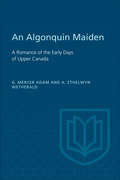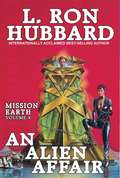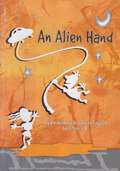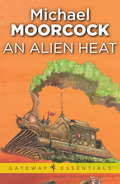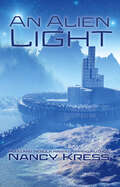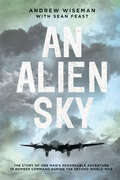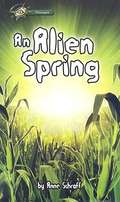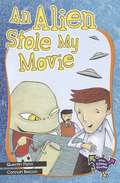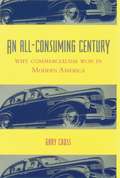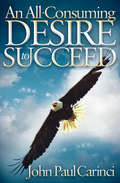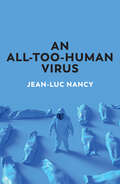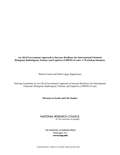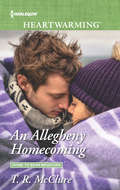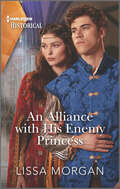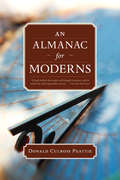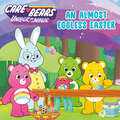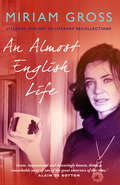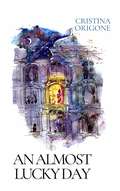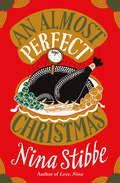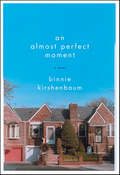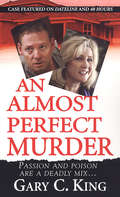- Table View
- List View
An Algonquin Maiden: A Romance of the Early Days of Upper Canada
by G. Mercer Adam A. Ethelwyn WetheraldShort excerpt: Man versus nature-the successive assaults of perishing humanity upon the almost impregnable fortresses of the eternal forests-this was the struggle of Canadian civilization, and its hard-won triumphs were bodied forth in the scattered roofs of these cheap habitations.
An Alien Affair (Mission Earth #4)
by L. Ron HubbardOnce it's it got you, it won't let you go. Fast, fiery, and nonstop fun, from the crash and roar of a demolition derby to the dark doings of the wicked Miss Pinch. In these continuing misadventures of aliens on Earth, Soltan Gris tells his sad tale of attempts to thwart his sworn enemy, Jettero Heller, who is on mission to salvage Earth. But Gris has to contend with a belly dancer who's spending him into bankruptcy, a mad PR man out to make Heller a legend, an unhinged Mafia hired gun sent to hit the Director of the CIA, and the sadistic Pinch with some ruinous recipes of her own. Throw in a perverse nurse, an intergalactic drug ring, a crazed cellologist, and the arrival of Heller's Voltarian girlfriend, and you have the ingredients for intrigue, satire, and romance that you won't be able to put down. Volume 4 of the biggest Science Fiction dekology ever written -- Mission Earth. "...action-packed, intricately plotted... a cross between Flash Gordon and 007." --Buffalo News
An Alien Dies (Animorphs Companion: The Andalite Chronicles, #3)
by K. A. ApplegateElfangor believed his mission was simple, but no one expected what he, Alloran, and Arbron were about to discover.
An Alien From Cyberspace
by Anne Schraff17-year-old Joshua must rescue an alien who is being held captive by a man Joshua met on the internet.
An Alien Hand: Supplementary Reader class 7 - NCERT - 23
by National Council of Educational Research and Training"An Alien Hand," an NCERT supplementary reader for Class 7, takes readers on a captivating journey through a collection of imaginative and thought-provoking stories. Each tale offers a unique perspective on human experiences, challenging conventional notions and igniting a sense of wonder. From a diminutive teacher nurturing the minds of giants to a bear imparting valuable life lessons, the narratives delve into diverse themes such as identity, compassion, environmentalism, and the essence of freedom. The book introduces characters like a girl raised by monkeys and a man expressing his yearning for freedom through a caged bird, while a talking alien hand prompts self-reflection. Infused with humor, warmth, and unexpected twists, "An Alien Hand" entertains, surprises, and leaves readers pondering their own place in the world.
An Alien Heat: Lyrics For An Alien Heat (Gateway Essentials #404)
by Michael MoorcockThe universe is dying; at the End of Time the last remnants of Humanity live amoral lives of decadence, constantly seeking new diversions and sensations. So when Mrs Amelia Underwood is mysteriously transported to the End of Time Jharek Carnelian decides to fall in love with her, but when Amelia returns to her own period of history, Jherek follows her and finds himself plunged into the strange world of Victorian London.
An Alien Light
by Nancy KressIn this epic science fiction tale by an award-winning author, two warring tribes are the subjects of a strange alien experiment. Epic in scope, peopled by characters from every strata of profoundly different societies, An Alien Light is an unflinching look at the strengths and weaknesses of the genetic, evolutionary, and historical inheritance that all of us share. Arys, a glassblower and outcast. Jehane, a skilled female warrior. Dahar, with a deeply inquisitive mind. Grax, an alien with profound doubts. These four and hundreds of others are thrown together in an experiment to determine the fate of humanity, both on Earth and in her galactic colonies. For the Ged, the stakes are nothing less than the outcome of a war. For the humans, ignorant of the larger situation, the rewards for participating are incredible riches. But no one except the alien Ged understands the criteria for being chosen. When that knowledge comes, there is no agreement about if, how, or when to use it. Some will betray others. Some will sacrifice. Some will die. And some must succeed, no matter the price. Praise for An Alien Light&“This heady mix of fantasy and sf explores humanity&’s infinite capacity for change. Highly recommended.&” —Library Journal
An Alien Sky: The Story of One Man's Remarkable Adventure in Bomber Command During the Second World War
by Sean Feast Andy WisemanThe legendary RAF bomber who survived the infamous Stalag 3 POW camp recounts his WWII experiences in this military memoir. Growing up in Berlin just as Adolf Hitler was coming to power, Andrew Wiseman escaped to Poland with is family when he was thirteen. He later made his way to England where he joined the Royal Air Force, training first as a pilot and then as an air bomber in South Africa. Joining No. 466 squadron, he flew Handley Page Halifax heavy bombers in a handful of operations before being shot down in Occupied France. Wiseman spent the next year as a prisoner of war in Nazi prison camp Stalag Luft III, where he used his knowledge of Russian, Polish and German to act as a camp interpreter. Taking part in the prison break known as the Great Escape, Wiseman acted as a scrounger for the X committee who dug the tunnel. Moved from camp to camp, he was one of those forced into the Long March when the Germans attempting to escape the Russian advance. He later played a key role in avoiding bloodshed when the Russians refused to allow British and Norwegian prisoners to return home—a role for which he was later recognized by the King of Norway. Co-written with the acclaimed aviation historian Sean Feast, Andrew Wiseman&’s wartime memoir is a vivid chronicle of courage, service and survival through the Second World War.
An Alien Spring
by Anne SchraffHysteria builds in a small town when a teenage boy is labeled as a disease-spreading alien.
An Alien Stole My Movie (Into Reading, Level O #53)
by Connah Brecon Quentin FlynnNIMAC-sourced textbook <p><p> The special effects for this class's science-fiction movie project are so cool that you'd think they were real! And those aliens look like they've just arrived from space! This is going to be one movie the cast and crew will never forget.
An All-Consuming Century: Why Commercialism Won in Modern America
by Gary CrossThe unqualified victory of consumerism in America was not a foregone conclusion. The United States has traditionally been the home of the most aggressive and often thoughtful criticism of consumption, including Puritanism, Prohibition, the simplicity movement, the '60s hippies, and the consumer rights movement. But at the dawn of the twenty-first century, not only has American consumerism triumphed, there isn't even an "ism" left to challenge it. An All-Consuming Century is a rich history of how market goods came to dominate American life over that remarkable hundred years between 1900 and 2000 and why for the first time in history there are no practical limits to consumerism.By 1930 a distinct consumer society had emerged in the United States in which the taste, speed, control, and comfort of goods offered new meanings of freedom, thus laying the groundwork for a full-scale ideology of consumer's democracy after World War II. <P><P>From the introduction of Henry Ford's Model T ("so low in price that no man making a good salary will be unable to own one") and the innovations in selling that arrived with the department store (window displays, self service, the installment plan) to the development of new arenas for spending (amusement parks, penny arcades, baseball parks, and dance halls), Americans embraced the new culture of commercialism—with reservations. However, Gary Cross shows that even the Depression, the counterculture of the 1960s, and the inflation of the 1970s made Americans more materialistic, opening new channels of desire and offering opportunities for more innovative and aggressive marketing. The conservative upsurge of the 1980s and '90s indulged in its own brand of self-aggrandizement by promoting unrestricted markets. The consumerism of today, thriving and largely unchecked, no longer brings families and communities together; instead, it increasingly divides and isolates Americans.Consumer culture has provided affluent societies with peaceful alternatives to tribalism and class war, Cross writes, and it has fueled extraordinary economic growth. The challenge for the future is to find ways to revive the still valid portion of the culture of constraint and control the overpowering success of the all-consuming twentieth century.
An All-Consuming Desire to Succeed
by John Paul CarinciAn inspirational self-help book for those seeking personal fulfillment and professional success from the author of The Power of Being Different. We are all searching for a better life, more inspiration, and a way to be more productive and fulfilled—without the constant competition in our personal lives and workplaces wearing us down. With An All-Consuming Desire to Succeed, you can learn to stand out from the crowd by discovering: how to maintain a competitive edge through positive affirmations; how to control negative influences; the secrets of the highly successful; how to plan out and achieve newfound goals; and lessons on how to motivate yourself to stay true to your unique vision. &“In the spirit of such inspirational authors as Norman Vincent Peale, Napoleon Hill, and W. Clement Stone, John Paul Carinci has written a classic self-help book centered around achieving success . . . Any reader seeking a healthy dose of positive motivation to achieve the loftiest goals or even to meet the daily challenges of life is sure to find much of value in John Paul Carinci&’s inspirational work.&” —Foreword Reviews
An All-Too-Human Virus
by Jean-Luc NancyIn the past, pandemics were considered divine punishment, but we now understand the biological characteristics of viruses and we know they are spread through social interaction. What used to be divine has become human – all too human, as Nietzsche would say. But while the virus dispels the divine, we are discovering that living beings are more complex and harder to define than we had previously imagined, and also that political power is more complex than we may have thought. And this, argues Nancy, helps us to see why the term ‘biopolitics’ fails to grasp the conditions in which we now find ourselves. Life and politics challenge us together. Our scientific knowledge tells us that we are dependent only on our own technical power, but can we rely on technologies when knowledge itself includes uncertainties? If this is the case for technical power, it is much more so for political power, even when it presents itself as guided by objective data. The virus is a magnifying glass that reveals the contradictions, limitations and frailties of the human condition, calling into question as never before our stubborn belief in progress and our hubristic sense of our own indestructibility as a species.
An All-of-Government Approach to Increase Resilience for International Chemical, Biological, Radiological, Nuclear, and Explosive (CBRNE) Events
by Sherrie ForrestChemical, Biological, Radiological, Nuclear, and high-yield Explosive (CBRNE) events have the potential to destabilize governments, create conditions that exacerbate violence or promote terrorism. This can trigger global repercussions. These events can quickly overwhelm the infrastructure and capability of the responders, especially in countries that do not have the specialized resources for response like those available in the United States. When a CBRNE incident occurs in a partner nation or other foreign country, the U. S. is often called upon to provide assistance. Interoperability - the ability to work together - among U. S. agencies, foreign governments, and responders involved in the effort is key to an efficient response. The effectiveness of the U. S. response and approach to CBRNE events in partner nations depends on the capability of the U. S. government to provide timely and appropriate assistance and the resilience of the partner nation to a CBRNE event. "An All-of-Government Approach to Increase Resilience for International Chemical, Biological, Radiological, Nuclear, and Explosive (CBRNE) Events" is the summary of a workshop convened in June 2013 by the National Institute of Standards and Technology and the National Research Council to discuss ways to strengthen the U. S. ability to prepare for and respond to CBRNE events that occur in U. S. partner nations. The workshop brought together diverse experts and stakeholders to identify capabilities that are necessary for responding to an international CBRNE event; discuss best practices and resources needed for improved interoperability of the U. S. and partner nation during response to a CBRNE event; and identify key questions that need to be addressed in follow up activities focused on improving U. S. CBRNE response in partner nations.
An Allegheny Homecoming
by T. R. McclureWhat happens when you do go home again? One mistake cost Josh Hunter almost everything. Burning his bridges was easier than coming home. Yet here he is, eight years-and one family crisis-later, back in his Pennsylvania town playing unlikely rescuer to a blizzard-stranded stranger. Local newscaster Wendy Valentine is looking for the story that will make her name as a serious journalist. The tragic secret Josh is concealing could be her stepping-stone. Funny then that Wendy seems more interested in the sizzling personal dynamics playing out between them!
An Alliance with His Enemy Princess
by Lissa MorganA high-stakes, Medieval enemies to lovers story.A royal decreeThat will change their lives… Norman knight Rolant Guyarde has come to conquer a Welsh fort, but when he meets its mistress, he realizes she&’s the sword-wielding &“soldier&” he fought en route! Despite their being enemies, he finds himself intrigued by the brave, beautiful Princess Gwennan. When they&’re forced into an uneasy alliance, Rolant helps her petition the king for her parents&’ release from prison. But in exchange for their freedom, the king demands a price neither Rolant nor Gwennan expects!From Harlequin Historical: Your romantic escape to the past.
An Almanac for Moderns
by Donald Culross PeattieAn Almanac for Moderns contains a short essay for each day of the year that contemplates a unique but factual aspect of unbridled nature. According to a review in Nation, this collection of essays manages to "appeal to the ordinary lover of nature . . . but the turn of Peattie's mind is poetic and speculative." The New York Times calls this book "a fine and subtle perception . . . rising at times to an intense lyric beauty . . . a book which the reader will deeply treasure, and to which he will repeatedly return."
An Almanac for Moderns
by Donald Culross PeattieAn Almanac for Moderns contains a short essay for each day of the year that contemplates a unique but factual aspect of unbridled nature. According to a review in Nation, this collection of essays manages to "appeal to the ordinary lover of nature . . . but the turn of Peattie's mind is poetic and speculative." The New York Times calls this book "a fine and subtle perception . . . rising at times to an intense lyric beauty . . . a book which the reader will deeply treasure, and to which he will repeatedly return."
An Almost Eggless Easter (Care Bears: Unlock the Magic)
by Alexandra WestCelebrate Easter with the Care Bears in this 8x8 book based on an episode of the animated Care Bears: Unlock the Magic series.When the Easter Bunny loses his eggs in a Silver Lining stream, the Care Bears rescue them--only to discover the eggs have lost all their color! Can the Care Bears use their belly-badge powers to help the Easter Bunny recolor his eggs and save Easter? Read along to find out!
An Almost English Life: Literary, And Not So Literary, Recollections
by Miriam GrossA sparklingly witty memoir, which takes us on a seductive journey from wartime Jerusalem to the heart of Fleet Street, providing a riveting outsider's view of English cultural life.
An Almost Lucky Day: What happened to the new tenant on the top floor? Why is Mario accused of his disappearance?
by Cristina OrigoneAn Almost Lucky Day What happened to the new tenant on the top floor? Why is Mario accused of his disappearance? Mario is an elderly concierge with no ambition other than taking care of the condominium where he works. He has always carried out his duties with pride but, since he is aware that he will soon retire, he feels a sense of depression and a lack of energy that makes him neglect his work and himself, causing the irritation of Abigaille a rich and elderly lady of the condominium. A female mannequin, found in the garbage, and a large win will shake his life; but just when he realizes that he can still be happy, instead of finding himself in some exotic place enjoying the money, he finds himself in the carabinieri barracks accused of a crime he swears he did not commit. What happened to the new tenant on the top floor? Why is Mario accused of his disappearance? "An almost lucky day" is the story of a man who, at the same moment in which fate gives a dream, will have to deal with the blindfolded Goddess.
An Almost Perfect Christmas
by Nina StibbeFrom the author of Love, Nina, a hilarious account of the highs of lows of Christmas season"My mother is not a foodie. But for as long as I can remember, once a year, she becomes possessed of a profound and desperate need to serve up a perfect roast turkey. Faced with a walk into the village though, she might think 'oh, f*** it' and decide to get a frozen one from Bejams on the 23rd and leave it to defrost in the downstairs toilet for not quite 48 hours." From perennially dry turkeys to Christmas pudding fires, from the round robin code of conduct to the risks and rewards of re-gifting, An Almost Perfect Christmas is an ode to the joy and insanity of the most wonderful time of the year.
An Almost Perfect Moment: A Novel
by Binnie KirshenbaumIn Brooklyn, in the Age of Disco, Valentine Kessler -- a sweet Jewish girl who bears a remarkable resemblance to the Virgin Mary of Lourdes -- has an unerring gift for shattering the dreams and hopes of those who love her. Miriam, her long-suffering mother, betrayed and anguished by the husband she adores, seeks solace in daily games of mah-jongg with The Girls, a cross between a Greek Chorus and Brooklyn's rendition of the Three Wise Men, who dispense advice, predictions, and care in the form of poppy-seed cake and apple strudels. When her greatest fear for Valentine is realized, Miriam takes comfort in the thought that it couldn't get any worse. And then it does.Sagacious, sorrowful, and hilarious, An Almost Perfect Moment is a novel about mothers and daughters, star-crossed lovers, doctrines of the divine, and a colorful Jewish community that once defined Brooklyn.This P.S. edition features an extra 16 pages of insights into the book, including author interviews, recommended reading, and more.
An Almost Perfect Murder
by Gary C. KingA critical care nurse marries his patient&’s widow only to later poison her in this true crime story by the author of Stolen in the Night.A Woman with A Passion For Power . . .Kathy Marie Augustine was not out to make friends. In politics, she rose to the top by playing hardball—and pushing her way through the old boy&’s network of the Nevada legislature, rising to the rank of State Controller. When she died, only a few people shed tears—including the man who killed her.A Killer with A Foolproof Plan . . .Chaz Higgs was a former body-builder turned intensive care nurse who saw wealthy, sexy Kathy Marie Augustine as his meal-ticket—until he couldn&’t stomach her domineering personality any longer. When Chaz decided he&’d had enough, he chose a poison that would leave no evidence behind.Murder Hidden in Plain Sight . . .The death of a nationally-known politician made headlines, but one slip of the tongue came to the attention of a determined Nevada detective. Now, true-crime master Gary C. King takes us into the extraordinary life and death of a famously ambitious woman politician, behind the scenes of the investigation that unearthed shocking secrets, and into the heart and mind of a man who nearly got away with the perfect crime . . .Includes Sixteen Pages of Revealing Photos
